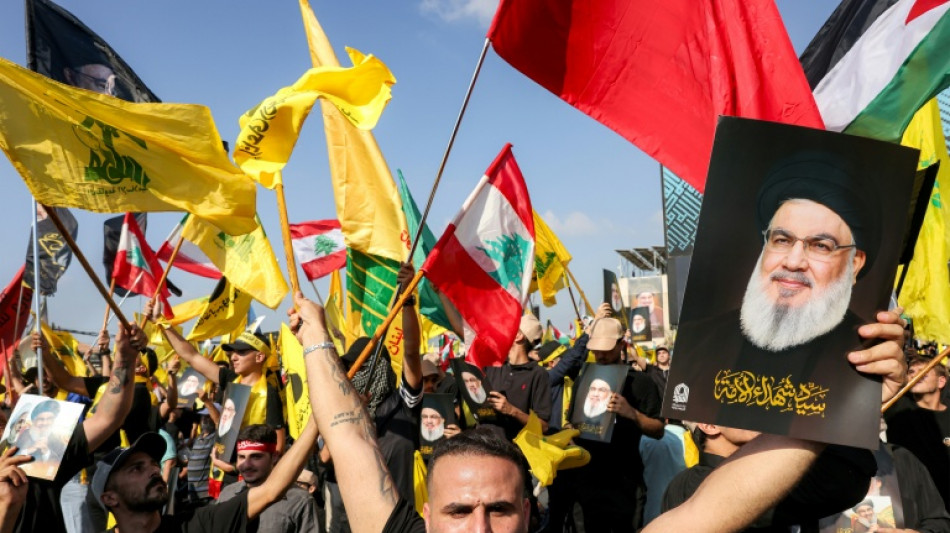

Hezbollah says it refuses to be disarmed one year after leader's killing
Hezbollah chief Naim Qassem said the group would not allow itself to be disarmed on Saturday as he addressed supporters marking one year since the killing by Israel of his predecessor Hassan Nasrallah.
The charismatic leader was killed in an Israeli air strike on the southern suburbs of Beirut on September 27, 2024.
Without Nasrallah and with much of its military capability destroyed by Israel, Hezbollah's grip on Lebanese politics has weakened, and Beirut has ordered the army to disarm the group.
"We will never abandon our weapons, nor will we relinquish them," Qassem told the tens of thousands of supporters gathered at the tomb of the former chief on Saturday.
"We are ready for martyrdom," he added.
Iran-backed Hezbollah, weakened by a deadly war with Israel last year, has organised a series of commemorative events to mark Nasrallah's death.
Waving the group's yellow banner as well as Lebanese, Palestinian and Iranian flags, Hezbollah supporters gathered at the mausoleum, near Beirut airport, chanting "death to America, death to Israel" while partisan and religious songs blared from loudspeakers, an AFP journalist reported.
- 'A new cause' -
Speaking before Qassem's address, many of the supporters gathered for the anniversary said disarmament must not be allowed to happen.
Wisam Hodroj, a 51-year-old working in Iraq, arrived early at the commemorations.
Draped in black, he said: "What has happened since the last war has only increased our enthusiasm and strength. Today, we have a new cause -- we will not compromise on our weapons, and we will not hand them over."
Nearby, Ali Jaafar, a 21-year-old university student, told AFP: "Handing over the weapons is the dream of the enemies, the internal and external ones -- but it will remain just a dream."
Zahraa Haidar, an 18-year-old student, said they "went through difficult times... we have the resolve and the strength to never surrender our weapons and never submit to the enemy".
Iranian security chief Ali Larijani was in attendance. Tehran is a key supporter of Hezbollah.
- 'More than words' -
Hezbollah is commemorating the killings of Nasrallah and second-in-command Hashem Safieddine in a series of events which began on Thursday with the projection of their images onto the iconic Raouche rock in Beirut, despite government opposition and the party's lack of official authorisation.
That opposition in turn drew criticism of the government from Hezbollah supporters.
In a statement on Saturday, Lebanese President Joseph Aoun expressed his hope that "this painful anniversary will serve as a rallying point, reinforcing the belief that Lebanon's salvation lies in having one unified state, one army and constitutional institutions that protect sovereignty and uphold dignity".
Despite a November ceasefire that ended over a year of hostilities between Hezbollah and Israel, the latter has kept up regular strikes on Lebanon and still has troops positioned at five border points inside Lebanon.
Hezbollah is under intense pressure to hand over its weapons, with the Lebanese army having drawn up a plan to disarm it, beginning in the south.
Lebanon itself is under pressure from the United States and ongoing Israeli strikes.
Israeli Prime Minister Benjamin Netanyahu praised Lebanon's efforts towards disarming Hezbollah from the United Nations General Assembly on Friday, but said he needed "more than words".
Hezbollah was the only major armed group allowed to keep its weapons following Lebanon's civil war, because it was fighting continued Israeli occupation of the south.
The group's heartlands are in mainly Shiite southern and eastern Lebanon, as well as south Beirut.
In October 2023, it began launching rockets at Israel in support of Hamas in Gaza. Months of exchanges escalated into all-out war in September 2024, before a ceasefire was agreed two months later.
E.Goossens--JdB



